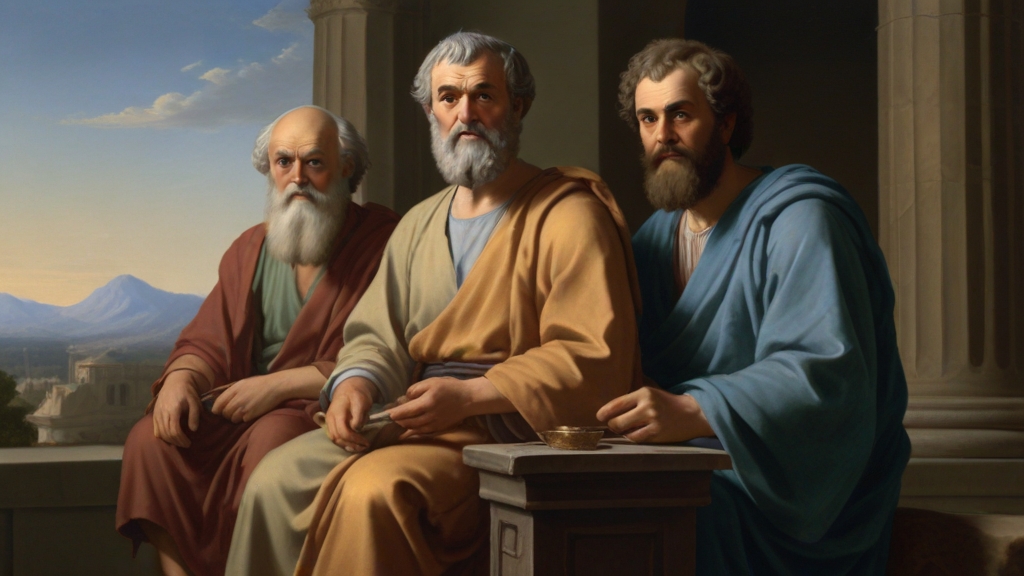
Big Ideas from History’s Biggest Thinkers
Philosophy is like one big conversation that’s been going on for thousands of years. From ancient Greece to modern day, philosophers have debated life’s biggest questions: What does it mean to live a good life? How can we know what’s true? Do we have free will? Is there a God? While they don’t always agree, reading what these thinkers had to say can help give us perspective on how to live meaningful, thoughtful lives. Let’s dive into some of their big ideas!
The Ancient Greeks: Laying the Foundations
Way back in the day, before iPhones or Instagram, a group of bearded Greek guys in togas basically invented philosophy as we know it. Socrates, Plato, and Aristotle were some of the biggest names and they focused a lot on ethics: how should people behave? What does it mean to live virtuously? They came up with ideas like “know thyself” (Socrates), the Allegory of Cave (Plato) and the Golden Mean (Aristotle). These dudes truly had some wisdom for the ages!
Then along came Hellenistic philosophers like Epicurus and Stoics like Seneca who started schools of thought around happiness and freedom from distress. Epicurus preached attaining pleasure through simple living (not wild partying!) while the Stoics thought we should accept life calmly without complaint. And the Skeptics doubted whether we could really know anything at all! As you can see, the ancient Greeks covered a lot of ground that we still think about today.
The Middle Ages: Faith Seeking Understanding
After the fall of Rome, philosophy took a bit of a backseat to religion in medieval Europe. St. Augustine and St. Thomas Aquinas used philosophy to better understand Christian faith. Augustine thought a lot about the nature of good and evil in his book Confessions, which draws on his own life story. Aquinas tried to logically prove God’s existence through his “Five Ways” and also focused on ethics. Though deeply religious, these thinkers applied reason within their faith and paved the way for future generations of philosophers.
The Renaissance & Enlightenment: Questioning Tradition
Fast forward to the Renaissance and Enlightenment, and philosophy started questioning tradition even more. Renaissance thinkers like Machiavelli focused on realism over idealism in politics and human nature. Major movements included humanism, which valued human dignity and potential.
In the Enlightenment, philosophers like John Locke and David Hume advocated using reason and science to improve society. They challenged absolute monarchs and rigid religious dogma. Other Enlightenment thinkers like Voltaire fought for liberty, free speech and separation of church and state through satirical writings. Women philosophers like Mary Wollstonecraft also arose, arguing for women’s equality. This was a time of immense hope in using knowledge for human progress.
German Idealists: Transcending Reason & Experience
So just when rationalism and empiricism were gaining steam in the late 1700s, along came German idealists like Immanuel Kant, Georg Hegel and Arthur Schopenhauer who were like “hold my beer.” This trio believed reality ultimately stems from mental concepts and consciousness, not just material things. Kant wanted to reconcile rationalism with empiricism, while Hegel saw the progress of history unfolding through dialectical reasoning. Schopenhauer took a more pessimistic view of the world as ultimately an irrational, aimless struggle. Big stuff!
Existentialists: Dealing with That Meaning of Life Thing
Existentialism arose in the late 1800s and hit its stride in the mid-1900th century with thinkers like Søren Kierkegaard, Friedrich Nietzsche, Jean-Paul Sartre and Simone de Beauvoir. These philosophers focused on the loneliness of individual existence and the search for meaning in an absurd universe without God. Kierkegaard stressed taking “leaps of faith.” Nietzsche said “God is dead” and emphasized asserting our own values in a meaningless world. Sartre and de Beauvoir applied existentialist ideas to human relationships and modern life. This group was all about seizing responsibility in an unjust world.
Positivists: Confirming Knowledge through Science
Beginning in the 1800s, more scientifically-minded philosophers including Auguste Comte and the logical positivists tried to firmly ground philosophy in factual knowledge confirmed by the empirical sciences. Thinkers like Bertrand Russell and Ludwig Wittgenstein focused on mathematical and linguistic analysis. Positivism rejected grand metaphysical speculation in favor of logical analysis of what we can clearly observe and verify. This empirical approach remains influential in psychology, economics and political science today.
Pragmatists: Assessing Ideas Based on Their Useful Application
Meanwhile in America in the late 1800s, Charles Sanders Peirce, William James and John Dewey pioneered the philosophical movement of pragmatism. Deeply influenced by Darwin’s evolution, these thinkers assessed ideas based on their practical value and results, not just lofty abstract reasoning. James applied this to morality and free will, while Dewey advocated for pragmatic learning and democracy. They were all about focusing on real human experience and needs.
Postmodernists: Questioning How Language Shapes Reality
Most recently in the mid-1900s, postmodern thinkers like Jacques Derrida and Michel Foucault critiqued modernity and how language constructs our social reality. Derrida promoted “deconstruction” of texts and problematic biases in Western thinking. Foucault analyzed how power relations shape social institutions. Postmodernism is highly skeptical of absolute truth claims and grand theories, emphasizing pluralism and continually questioning systems of authority.
This whirlwind tour shows we all stand on the shoulders of philosophical giants! By studying their influential ideas, we can clarify our own beliefs and discover new perspectives. What thinkers intrigue you? Whose big ideas resonate with how you see life? That curiosity and openness to learning is the heart of philosophy. With an understanding of what came before us, we can all contribute our own two cents to humanity’s ongoing conversation about how to live thoughtful, purpose-driven lives. The floor is yours!